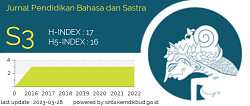Implikatur Tuturan Guru dalam Pembelajaran di Sekolah Menengah Atas: Suatu Kajian Pragmatik
Abstract
Learning is a process of delivering knowledge to students. Teachers as learning facilitators can use utterances that contain implicatures in them. The purpose of this study was to find and describe the form, function, and benefits of using implicatures in the teacher's utterances during the learning process. In addition, this study intends to interpret the responses of students to the teachers’ utterances that contain implicatures in it. The research data is in the form of words in the teacher's speech which are indicated to contain implicatures. The data was obtained from the transcription of recorded speeches by the teacher of Indonesian History and Indonesian Language class XII majoring in Science and Social Sciences at SMA Negeri Arjasa, Jember. The data that has been collected was analyzed using a pragmatic approach that empowers the theory of speech mode, the communicative function of speech acts, and the benefits of implicatures. The results of this study indicate that 1) there are three forms of implicature found, namely imperative, interrogative, and declarative forms, 2) several functions of implicature were found, namely the function of asking or ordering, threatening, advising, insinuating, and reprimanding), 3) there are four benefits of using implicatures, namely smoothing speech, training sensitivity, creating the impression of humor, and motivating students, 4) In addition, it can be said that students understand the teacher's speech that contains implicatures.
Keywords
Full Text:
PDFReferences
Alisjahbana, T. (1986). Tata Bahasa Baru Bahasa Indonesia. Jakarta: Dian Rakyat.
Anindya, B., Revita, I., & Sastra, G. (2019). “Jenis Implikatur Percakapan antara Pramuniaga Mobil Mitsubishi dengan Konsumen di Kota Padang”. Al-Turas: Mimbar Sejarah, Sastra, Budaya, dan Agama, 25(1), 1-16. https://doi.org/10.15408/bat.v25i1.11117.
Denzin, N. K., & Lincoln, Y. S. (1994). Handbook of Qualitative Reasearch. London: Sage Publications.
Ghufron, A., Budiningsih, C. A., & Hidayati. (2017). “Pengembangan Pembelajaran Berbasis
Nilai-nilai Budaya Yogyakarta di Sekolah Dasar”. Cakrawala Pendidikan, 36(2), 309-319. https://doi.org/10.21831/cp.v36i2.12449.
Grice, H. P. (1975). “Logical and Conversation” Sintax and Semantic, Speech Act. New York: Academic Press.
Jasmir, R. A., Sartika, W., & Magria, V. (2021). “An Analysis of Conversational Implicature in Podcast Deddy Corbuzier’s YouTube”. Tell Us Journal, 7 (1): 80-94. https://doi.org/10.22202/tus.2021.v7i1.4824.
Komalasari, K. (2010). Pembelajaran Kontekstual Konsep dan Aplikasi. Bandung: PT Refika Aditama.
Leech, G. (1993). Prinsip-prinsip Pragmatik (terjemahan M.D.D. Oka). Jakarta: UI-Press.
Levinson, S. C. (1991). “Pragmatic Reduction of Binding Condition Revisited”. Journal of Linguistics, 27 (1), 107-161. https://doi.org/10.1017/S0022226700012433.
Mustaqim, M. S., Djatmika, & Marmanto, S. (2019). “Jenis Tindak Tutur Ekspresif Antologi Cerpen Penjagal Itu Telah Mati Karya Gunawan Budi Susanto”. Aksara, 31(2), 311-324. https://doi.org/10.29255/ aksara.v31i2.318.311-324
Nadar, F. X. (2009). Pragmatik dan Penelitian Pragmatik. Yogyakarta: Graha Ilmu.Pustaka Pelajar.
Prakoso, I. J. R., & Fauzia. (2018). “A Study of Implicature in Daredevil Web Series Movie”. English Language Teacing Educational Journal (ELTEJ), 1(2), 106-114. https://doi.org/10.12928/eltej.v1i2.54.
Pramujiono, A., Suhari, Rachmadtullah, R., Indrayanti, T., & Setiawan, B. (2020). Kesantunan Berbahasa, Pendidikan Karakter, dan Pembelajaran yang Humanis.Tangerang: Indocamp.
Prasetiyo, A. B., Muji, & Widjajanti, A. (2022). Implikatur Tuturan Pramuniaga Dempo Cosmetic. Deiksis, 14(1):51-62.
Prastio, B., Nurzafira, I., Ghazali, A. S., & Pratiwi, Y. (2020). “Question Patterns and Conversation Implicature on Traditional Market in Lampung-Indonesia”. LITERA: Jurnal Penelitian Bahasa, Sastra, dan Pengajarannya, 19(2), 261-277. https://doi.org/10.21831/ltr.v19i2.31170.
Pudyastuti, L. A., & Zamzani. (2019). “Implikatur Percakapan dalam Pembelajaran Bahasa Indonesia di Sekolah”. Widyaparwa, 47(1), 21-32. https://doi.org/10.26499/wdprw.v47i1.316.
Rahardi, K. (2005). Pragmatik: Kesantunan Imperatif Bahasa Indonesia. Jakarta: Erlangga.
Rakhmat, J. (2007). Persepsi dalam Proses Belajar Mengajar. Jakarta: Rajawali Pers.
Ramlan. (2005). Ilmu Bahasa Indonesia: Sintaksis. Yogyakarta:Karyono.
Ratu, D. M., Meruntu, O. S., & Palar, W. R. (2018). “Pragmatic Implicature of Manadao Malay
Speakers Question”. 1st International Conference on Social Sciences, 226, 908-912. https://doi.org/10.2991/icss-18.2018.188
Salmon, W. (2011). “Conventional Implicature, Presupposition, and the Meaning of Must”. Journal of Pragmatics, 43(14), 3416-3430. https://doi.org/10.1016/j.pragma.2011.07.011.
Sari, R. I. (2017). “Bentuk Tuturan Direktif pada Guru dalam Situasi Pembelajaran Bahasa Indonesia Siswa Kelas X MAN Malang 1”. Kembara: Jurnal Keilmuan Bahasa, Sastra, dan Pengajarannya, 3(1), 79-97. https://doi.org/10.22219/kembara.v3i1.4380.
Searle, J. R. (1971). The Philosophy of Language (Oxford Reading in Philoshophy). London: Oxford University Press.
Searle, J. R. (1979). Expression and Meaning. Cambridge: Cambridge University Press.
Sembiring, R. J. BR., Pranowo, & Rahardi, R. K. (2018). Pengembangan Buku Ajar Konteks Situasi dan Sosial dalam Pragmatik Edukasional. Jurnal Pendidikan Bahasa dan Sastra, 18(2):246-258.
Shardimgaliev, M. (2019). “Implicatures in Judicial Opinions”. International Journal of Pragmatics, 32, 391-415. https://doi.org/10.1007/s11196-018-09601-4.
Sukarno. (2015). “Politeness Strategies in Responding to Compliments in Javanese”. Indonesian Journal of Applied Linguistics, 4(2), 91-101. https://doi.org/10.17509/ijal.v4i2.686.
Suprobo, G. D. W. (2015). Sindiran dalam Serial TV Kath and Kim. Tesis. Yogyakarta: Universitas Gadjah Mada.
Tsojon, I. Y., & Jonah, P. K. (2016). “An Analysis the Pragmatic Implicatures of Selected Advert Billboards Around Jos Metropolis in Terms of Grice (1975) Maxims of Cooperative Priciple”. International Journal of English Language Teaching, 3(11), 42-49. https://doi.org/10.5430/ijelt.v3n1p42
Vallejo, D. R. (2017). “Actually Effects as Conversational Impicatures”. Journal of Pragmatics, 112, 44-67. https://doi.org/10.1016/j.pragma.2017.02.005.
Wijana, I. D. P. (1996). Dasar-dasar Pragmatik. Yogyakarta: Andi Offset.
DOI: https://doi.org/10.17509/bs_jpbsp.v22i2.55908
Refbacks
- There are currently no refbacks.
Copyright (c) 2023 Jurnal Pendidikan Bahasa dan Sastra
p-ISSN 1412-0712 | e-ISSN 2527-8312
JPBS is published by:
Fakultas Pendidikan Bahasa dan Sastra (Faculty of Language and Literature Education), Universitas Pendidikan Indonesia,
in cooperation with
TEFLIN, and APPBIPA


